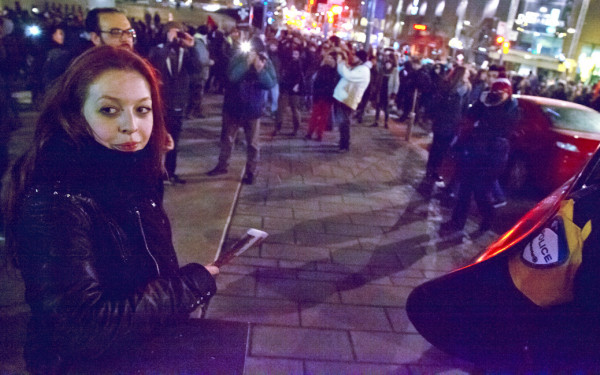Montreal Women’s March Takes a Stand Against Trump
Thousands Gather Downtown in Solidarity With Protests in Washington
“Solidarity—Divided, we fall,” read a huge sign among the crowd. A day after President Donald Trump’s inauguration, thousands protested at Place des Arts to show solidarity for American women doing just the same south of the border.
Although organizers labelled the event a Women’s March like the 675 other protests happening throughout the world, the event was a standing protest. Speakers blasting rock’n’roll tunes welcomed the protesters, inviting them to “give peace a chance” as The Beatles’ hit goes.
The crowd was a colourful one, with many pussy hats—pink hats with cat-like ears—and bright signs illuminating the light fog that surrounded the scene.
“I am part of a bunch of knitting networks,” said Deborah van Wyck, a member of the security team there. “I just like the idea of it, having something simple, artisanal, something we do, but also a symbol of power. I hope there’s tons of pussy hats in Washington.”
3_900_600_90.jpg)
The protest was organized in just a few weeks through a Facebook group, as volunteers were recruited before Christmas. A small core of Canadian and American women from civil societies and various activist movements met on social media and collaborated with the city to make the protest happen.
Many of the speeches placed an emphasis on intersectionality. Members of the organizing board included both Indigenous and Black women.
“We are affected by what happens in the United States,” Women’s March spokeswoman Alia Hassan-Cournol said. She found herself coordinating the march after a few meetings. Along with most of the speakers, she highlighted how Quebec and Canada are not removed from systemic racism.
Emilie Nicolas, who spoke for Québec Inclusif, highlighted for instance that some politicians tended to minimize systemic oppression, questioning Justin Trudeau’s and Quebec Premier Philippe Couillard’s acts.
Hate crimes in Quebec by May 2015 have increased by 47 per cent since 2003. Many comments left on the Facebook page of the event echoed this surge, insulting women who decided to march and insisting that Quebecers had more important concerns to focus on. Security at the protest was a concern for both the organizers and the city.
3_706_1050_90.jpg)
“The security service is here to make sure everything goes smoothly. The police is here too,” protester Ariane Ollier-Malaterre explained, showing the words “Service d’ordre” on her yellow jacket.
For Ollier-Malaterre, a gender studies professor at UQAM, the Women’s March is her first attempt at activism. A teacher and a mother of three kids, she confessed how hard it was to commit to activism in her everyday life.
“I decided to walk because for ten or fifteen years, I have noticed in society and in academic literature that women’s rights are contested,” she explains. “In many parts of the world, women and especially girls—very young girls—are threatened.”
Toula Drimonis, a writer and editor for the Huffington Post, and Cathy Wong, a columnist for Le Devoir introduced both speakers and performers. The protest opened on a performance from Mohawk Buffalo at Singers and Barbara Diablo.
A dozen of speeches followed, given by women’s rights local activists as well as Black rights and transgender rights activists. Former Montreal journalist Sue Montgomery, who created the hashtag #BeenRapedNeverReported, ended her speech on a hopeful note by quoting American anthropologist Margaret Mead, “never doubt that a small group of thoughtful, committed citizens can change the world.”
D.T., a trans woman and migrant rights advocate from Tunisia, spoke about her experience of struggling to “get the same rights as other Quebec women.” She showed that even though trans rights have received more media coverage in the past year, trans women—especially migrants—did not see their conditions improving.
2_663_1050_90.jpg)
As well, Indigenous journalist and activist Maïtée Labrecque-Saganash also shared her experience in fighting oppression and sexual violence.
Rachel Zellers, a writer and critical race theorist, had previously spoken for Girls Action Foundation and warned the protesters about how easy it was to “dismiss Trump as an accident in American history.” She said that his election was instead the symptom of a broader backlash against Black women’s rights.
Will Prosper, a long-life social activist who fights for Black rights, was the only man to speak. He acknowledged his privilege, and shared his concerns about the wage gap and women’s sexual security. A few Black Lives Matter signs popped up in the crowd in support.
Across Canada, people gathered and protested in 29 other towns and cities, along with 600 other locations worldwide. In Washington, an estimated 500,000 people protested.

2_900_600_90.jpg)
1_900_514_90.jpg)
4_900_600_90.jpg)
1_900_600_90.jpg)



_600_375_90_s_c1.JPG)
1_600_375_90_s_c1.jpg)
1_600_375_90_s_c1.jpg)